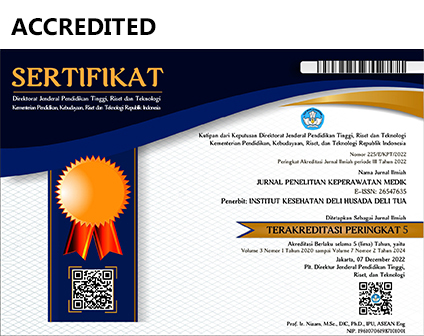FAKTOR PSIKOLOGIS DAN PSIKOSOSIAL YANG MEMPENGARUHI POST PARTUM BLUES DI RUANG NIFAS HIBRIDA RSU SEMBIRING
Abstract
Post partum blues is a mild effective syndromic disorder that occurs at the beginning of postpartum. Signs of symptoms that arise are sad reactions, crying, irritability, anxiety, self-blame, disturbances in sleep patterns and appetite disorders. Post partum blues symptoms are a multi-factorial mechanism consisting of hormonal factors, physical activity factors and psychosocial factors. This type of research is observational with cross sectional design. The population was all postpartum postpartum second day postpartum mothers in the postpartum Sembiring General Hospital Delitua sub-district in 2019 which was conducted on June 1-30, 2019. The sampling technique was done by total sampling which received 89 respondents and analyzed by chi square test significance level p = 0.05 . Independent variables are psychological and psychosocial factors and the dependent variable is post partum blues. The results of this study indicate that 66.3% of postpartum mothers experience post partum blues. From the variables obtained, each value of p = 0,000 (p<0.05), namely stress coping, self-adjustment, education and income, showed a significant relationship to the occurrence of post partum blues. The conclusions that can be drawn from this study are the psychological and psychosocial factors which most cause post partum blues are low economic factors. Therefore, to reduce the rate of occurrence of post partum blues, it is necessary to improve economic status.








